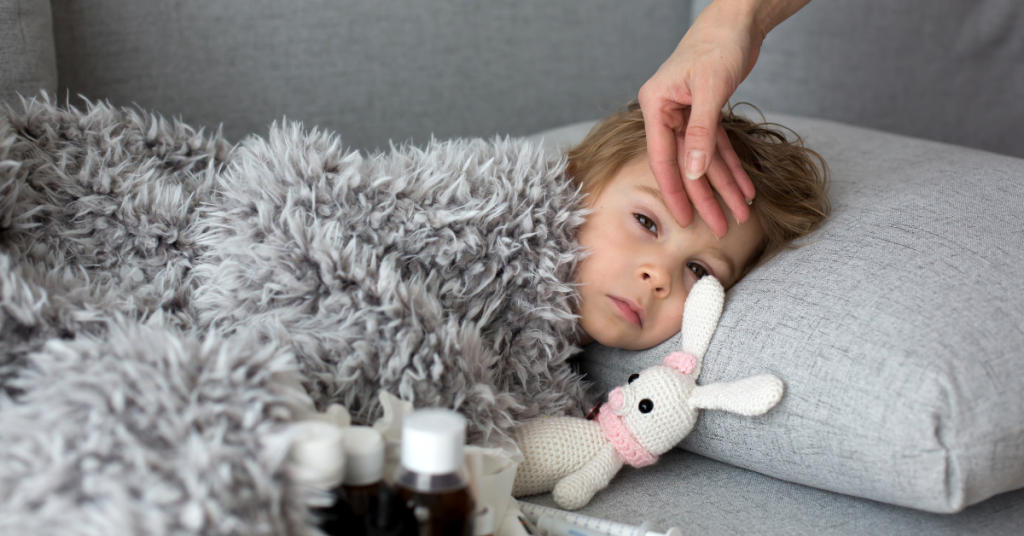 When it comes to our children, we need to trust that we are the expert because we know them the best! Every whine, every laugh, every cry has a distinct meaning. We, as their parents, can tell the difference between them all. This superpower comes in quite handy in our daily lives. However, when we’re trying to describe our child’s symptoms to a doctor, this is when we call those powers to action. We rely on doctors so much when our kids get sick, but doctors don’t know everything.
When it comes to our children, we need to trust that we are the expert because we know them the best! Every whine, every laugh, every cry has a distinct meaning. We, as their parents, can tell the difference between them all. This superpower comes in quite handy in our daily lives. However, when we’re trying to describe our child’s symptoms to a doctor, this is when we call those powers to action. We rely on doctors so much when our kids get sick, but doctors don’t know everything.
When Illness Takes Over
My son had gotten sick, just like all of our kids do. The issue with my little guy is he doesn’t talk due to his nonverbal autism, so generating the severity of his symptoms was impossible. After a couple of days of the typical symptoms, he had gotten worse. He lost his appetite, he developed a fever, and he wasn’t running around all over the place like he ALWAYS does. It was obvious my attempts at handling this on my own weren’t doing the trick, so we went to get him checked out. What I thought was just a standard virus turned out to be strep and Influenza type A. His pediatrician gave him a prescription for antibiotics and sent us on our way.
We started his antibiotics, followed the instructions perfectly, and waited for him to get better. He started to show signs of improvement but never truly recovered completely. His appetite and energy were off, but his fever was gone. I figured this was all due to the double threat he was dealing with. I kept an extra close eye on things and gave it time. On the second to last day of his antibiotics, he randomly threw up. We had eaten a greasy dinner that night, so I figured it just didn’t sit right. When I picked him up from school the next day, he was covered in a red rash with bumps and refusing to walk. Off to the doctor, we go! The pediatrician we saw said it was just a virus. He gave us some instructions for treating the rash and sent us home.
A Turn for the Worse
The next day, he was so much worse. Limping, screaming, crying in pain, we ended up in the ER. While the pediatrician was examining him, she noticed his hands, knees, and feet were swollen and hot to the touch. I asked her if it was possibly an allergic reaction, but she shut that suggestion down rather quickly. Thus began 6 hours of questions, tears, and trauma. Blood work, ultrasounds, and a urine sample were being tested to rule out autoimmune disease. Thankfully, they did! The diagnosis they gave us, again, was a virus. The treatment was to follow up with his pediatrician. I didn’t agree with the diagnosis, so I made a plan to take him to his doctor ASAP!
Help in the Right Place
Since there was a level of urgency, I managed to get him an appointment with his primary care physician the following day. By this time, he had developed a fever, wasn’t walking, and was barely eating. Every time my son is sick, he’s always still zooming around the house, constantly asking for more food when he should be resting. It’s hard to slow him down. I knew in my bones it wasn’t a virus, but at this point, two doctors told me it was. I didn’t know what to believe, but I know I am the expert here. Finally, we made it to his appointment, filled in his doctor on the entire story, and get a diagnosis: serum sickness. He was having an allergic reaction to his amoxicillin. With the proper medication and treatment plan, I’m happy to report that my son is back to his hyper, silly self!
Knowledge is Power
Even though 2 doctors gave me the same diagnosis, the knowledge I have of my son over people who had just met him played a major part in finally getting him the correct diagnosis. His PCP, the doctor who knows his repour and medical history was the key. A problem, I feel, we all tend to have is leaning too much on doctors. Holding them to unrealistic high standards because they are the “expert”. Forgetting that they, too, are human. People make mistakes. While the mistakes doctors make are grander and scarier than others, some can be fixed when we listen to our bodies, not ignoring the symptoms, and advocating for ourselves. Effort in the form of not giving up when we hear something that doesn’t feel right.
The knowledge we have of our children can’t be taught at any University. It’s through the long days and sleepless nights we share with our young caring for them, wiping away their tears when illness takes hold, and that is when we learn the most. This is when you know to trust yourself, that you’re the expert and this is when to fight for them.









